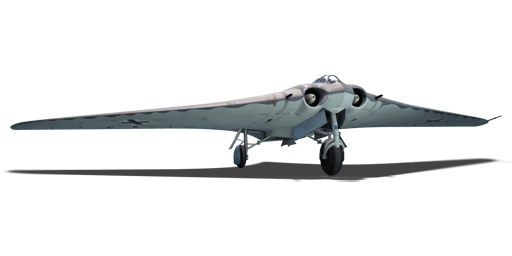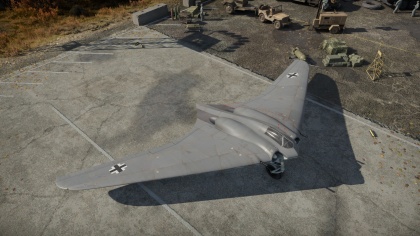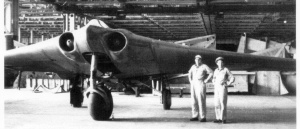Difference between revisions of "Ho 229 V3"
(Fixed up page) |
m (oops i havent been doing the mec part) |
||
| Line 65: | Line 65: | ||
! Arrestor gear | ! Arrestor gear | ||
|- | |- | ||
| − | | | + | | ✓ || ✓ || ✓ || ✓ || X <!-- ✓ --> |
|- | |- | ||
|} | |} | ||
| Line 81: | Line 81: | ||
! - | ! - | ||
|- | |- | ||
| − | | 980 || 450 || | + | | 980 || 450 || 580 || ~7 || ~4 |
|- | |- | ||
|} | |} | ||
| Line 94: | Line 94: | ||
! Radiator<br>(km/h) | ! Radiator<br>(km/h) | ||
|- | |- | ||
| − | | < 570 || < 600 || < | + | | < 570 || < 600 || < 420 || > 250 |
|- | |- | ||
|} | |} | ||
| Line 108: | Line 108: | ||
! WEP Engine power | ! WEP Engine power | ||
|- | |- | ||
| − | | | + | | 0 m || 1050 kgf || No WEP |
|- | |- | ||
<!--! colspan="3" | Setting 2 | <!--! colspan="3" | Setting 2 | ||
| Line 189: | Line 189: | ||
! Type | ! Type | ||
|- | |- | ||
| − | | | + | | Not controllable || rowspan="2" | Not controllable || rowspan="2" | Not controllable || rowspan="2" | Not controllable || rowspan="2" | Separate || rowspan="2" | Not ontrollable || rowspan="2" | Not controllable |
|- | |- | ||
|} | |} | ||
Revision as of 04:54, 20 February 2019
Contents
Description
The Ho 229 V3 is a Rank V German jet fighter with a battle rating of 7.3 (AB), 7.0 (RB), and 7.7 (SB). It was introduced in Update 1.43.
The Ho 229 V3 is the first and only jet in the "Zerstörer" tech tree of the Luftwaffe. Ironically, it goes against much of the doctrine set by the previous planes, favoring speed and maneuverability over armament and durability.
A thing that immediately will stand out with the Ho 229 V3 is how incredibly manoeuverable it is compared to most other jet fighters. The Ho 229 V3 can almost quite literally turn on a dime and can even in some circumstances out turn late ranked prop aircraft if maneuvered correctly. However, if it's manoeuverability is used to it's full extent, it also causes the plane to bleed speed at a crippling rate, making a sustained turn fight impossible to win. As such, it is advised to use the Ho 229 V3 as a Boom & Zoom fighter in order to maintain air speed and altitude. Remember that jet engines' efficiency is directly proportional to the IAS, due to the increased air intake, meaning the Ho 229 V3 will be accelerating very slowly between 0-500 km/h, but beyond will be able to outrun any propeller driven aircraft.
General info
Flight Performance
| Characteristics | |||||||
|---|---|---|---|---|---|---|---|
| Stock | |||||||
| Max Speed (km/h at 8,000 m) |
Max altitude (meters) |
Turn time (seconds) |
Rate of climb (meters/second) |
Take-off run (meters) | |||
| AB | RB | AB | RB | AB | RB | ||
| 867 | 839 | 12,000 | 28.6 | 29.3 | 16.8 | 15.8 | 850 |
| Upgraded | |||||||
| Max Speed (km/h at 8,000 m) |
Max altitude (meters) | Turn time (seconds) | Rate of climb (meters/second) |
Take-off run (meters) | |||
| AB | RB | AB | RB | AB | RB | ||
| 957 | 910 | 12,000 | 27.6 | 28.0 | 25.7 | 21.0 | 850 |
Details
| Features | ||||
|---|---|---|---|---|
| Combat flap | Take-off flap | Landing flap | Air brakes | Arrestor gear |
| ✓ | ✓ | ✓ | ✓ | X |
| Limits | ||||
|---|---|---|---|---|
| Wing-break speed (km/h) |
Gear limit (km/h) |
Combat flap (km/h) |
Max Static G | |
| + | - | |||
| 980 | 450 | 580 | ~7 | ~4 |
| Optimal velocities | |||
|---|---|---|---|
| Ailerons (km/h) |
Rudder (km/h) |
Elevators (km/h) |
Radiator (km/h) |
| < 570 | < 600 | < 420 | > 250 |
| Compressor (RB/SB) | ||
|---|---|---|
| Setting 1 | ||
| Optimal altitude | 100% Engine power | WEP Engine power |
| 0 m | 1050 kgf | No WEP |
Survivability and armour
- No armour plating
- No armour glazing
- Critical components located at front of aircraft (fuel, pilot, engine, controls)
- More fuel tanks located in wings near fuselage
Armaments
Offensive armament
The Ho 229 V3 is armed with:
- 2 x 30 mm MK 103 cannon, wing-mounted (170 rpg = 340 total)
Ammunition
- Default: HE-T(M) - HE(M) - IT; okay against planes.
- Air: HE-T(M) - HE(M) - HE(M) - IT; each Minengeschoß (mine-shell) has the same HE power as a 37 mm round, wonderful against anything that flies and light ground targets.
- Stealth: AP-I; useless, cannot destroy tanks/pillboxes, lacks the destructive force of HE against planes.
Usage in the battles
The Horten 229 flying wing is a dog fighter, heavy-fighter, or even an attacker.
Its single wing design allows for unseen manoeuverability despite the overweight of up to 8 tonnes, when equipped with full fuel load. This is however the Horten's literal downfall, the weight. Acceleration is awful, even the slowest of all jets. But the energy retention is great and climb acceptable. With that in mind rule number one of jet battle comes into play: "Do not turn fight!" The 229 will tempt anyone though. The low wing loading for a jet and even some piston planes allows for tight turning circles. Being heavy also allows to keep that velocity well in the initial turns, but with the inability to regain that speed afterwards... leads to a flaming prototype wreck thanks to an opportunistic enemy. The classic dogfight is thus only for emergency situations!
As a fighter stick with Boom & Zoom, the Ho 229's really heavy weight is of assistance in zoom climbs. However, it will also dampen the Horten's starting acceleration in a dive, making out diving an enemy difficult. The bad roll rate makes it hard to get that shoot on the target. But watch out! Don't pull too hard on the elevator to get that shot, or the Horten will lose to much speed (which cannot be regained quickly) or even worse, lose a wing.
The heavy fighter role equals the fighter one in every aspect, just that the targets are usually bombers. Stay fast, and try to get shots off in head-ons, or in slight diving turns from the bomber's six (tail), to make it difficult for the defensive gunners to hit the Ho 229.
The attacker role is a dangerous one. The Ho 229 will have to fly slow, in order to have time to properly aim, hit & evade trees. While all of these aren't difficult in the Horten 229 V3, it leaves the plane in a dangerous spot: low and without speed. Both are vital though for the sluggish 229. If in this role, be sure to have good escort fighters, as enemies can come at any time in jet combat.
Once the Horten is fully upgrade, or at least the performance parts is, one detail to notice is that the wings won't ripped so easily like before, but the Ho 229 still has to turn cautiously because it is still a wooden plane after all.
Specific enemies worth noting
The most dangerous enemy when in the Horten 229 is the F-84 Thunderjet. Since the Thunderjet gets an air spawn it already has all the energy it needs to get around the map quickly. There have been numerous occasions of players spawning in late only to be strafed by an F-84 Thunderjet on the runway. The Ho-229 is decent at accelerating once up to about 550 Km/H, past that point the Ho 229 becomes a V2 rocket in terms of acceleration until about ~750-800 Km/H, then there will be a hard time accelerating again.
Manual Engine Control
| MEC elements | ||||||
|---|---|---|---|---|---|---|
| Mixer | Pitch | Radiator | Supercharger | Turbocharger | ||
| Oil | Water | Type | ||||
| Not controllable | Not controllable | Not controllable | Not controllable | Separate | Not ontrollable | Not controllable |
Modules
| Tier | Flight performance | Survivability | Weaponry |
|---|---|---|---|
| I | Fuselage Repair | Offensive 30 mm | |
| II | Compressor | Airframe | |
| III | Wing Repair | New 30 mm Cannons | |
| IV | Engine | Cover |
Given the Horten's weight, the acceleration is an issue on the stock plane. Go for ammunition, engine and compressor upgrades first.
After that any upgrade is equally good. Weapon upgrades can wait, as the Mk 103 is the best gun in game, with high accuracy and long bursts stock. The belts are neither a priority, unless using the Ho 229 as attacker. Then the "Armored targets" is really useful against tanks & light pillboxes.
Pros and cons
Pros:
- Excellent armament, MK 103 is one of the best guns in the game.
- Great ammunition supply with 170 rounds per gun.
- Low wing loading, incredibly good at turning when flown at medium speeds (400-600 KPH).
- Good Energy Retention if not maneuvered harshly.
- Large range of different ammunition types proves suitability for Fighter and Attacker role.
- Outruns piston-engine aircraft and all jets the Allies have except for the F-84 Thunderjet when not uptiered.
- Thin Body makes it difficult for enemies to deal significant damage if flown straight.
- Low stall speed of 165 KPH.
- Fast when diving if flown at medium to high speeds before committing to a dive.
- Super-effective air brake, can bleed the speed in matter of seconds.
- Extremely sensitive ailerons.
Cons:
- Initial dive-acceleration is slow.
- Big target to hit when turning.
- Rate of climb is worse than late World War 2 and post war piston engine aircraft.
- Rips wings when applying full elevator at above 520 km/h IAS.
- Poor Rudder Authority - It yaws using independently controlled air brakes near the wing tips.
- Poor Roll Rate - Significantly hinders the ability to counter defensive scissors.
- Slow fire rate results in low firing density.
- Troublesome to land down, particularly with joystick control.
- Loses speed quickly in elevator turns.
History
The Ho 229 had three prototypes before the facility was overrun.
- V1 was a glider to test the design.
- V2 was a down-scaled prototype fitted with the Jumo 004B.
- V3 was a test bed for the serial production, it was however not completely finished when the US Army arrived.
Originally the V3 was intended to have the Jumo 004C jets, these weren't ready though and the Me 262A's 004B were installed. The final production version would have had the ability to load bombs, switch the main armament to four Mk 108 and the pilots were to be equipped with the Draeger pressure suit (G-Suit).
As of January 2015 the Smithonian Institution initiated the restoration of the V3 prototype to flying condition, despite its desolate state. The flying wing is currently housed in the Mary Baker Engen Restoration Hangar at the Steven F. Udvar-Hazy Center, Virginia.
Media
Screenshots and fan art
Camouflages
Skins and camouflages for the Horten 229 from live.warthunder
Read also
Links to the articles on the War Thunder Wiki that you think will be useful for the reader, for example,
- reference to the series of the aircraft;
- links to approximate analogues of other nations and research trees.
Sources
Paste links to sources and external resources, such as:
- topic on the official game forum;
- page on aircraft encyclopedia;
- other literature.
| Germany fighters | |
|---|---|
| Heinkel | |
| He 51 | He 51 A-1 · He 51 B-1 · He 51 B-2/H · He 51 C-1 · He 51 C-1/L |
| He 100 | He 100 D-1 |
| He 112 | He 112 A-0 · He 112 B-0 · He 112 B-1/U2 · He 112 B-2/U2 · He 112 V-5 |
| Messerschmitt | |
| Bf 109 (Jumo) | Flegel's Bf 109 A · Bf 109 B-1 · Bf 109 C-1 · Bf 109 C-1 |
| Bf 109 (DB-601) | Bf 109 E-1 · Bf 109 E-3 · Bf 109 E-4 · Bf 109 E-7/U2 · Bf 109 F-1 · Bf 109 F-2 · Bf 109 F-4 · Bf 109 F-4/trop |
| Bf 109 (DB-605) | Bf 109 G-2/trop · Bf 109 G-2 · Bf 109 G-6 · Bf 109 G-10 · Bf 109 G-14 · Bf 109 K-4 |
| Focke-Wulf | |
| Fw 190 (early) | Fw 190 A-1 · Fw 190 A-4 · Fw 190 A-5 · Fw 190 A-5 · Fw 190 A-5/U2 · Fw 190 A-5/U14 · Fw 190 A-8 · Fw 190 C |
| Fw 190 (late) | Fw 190 D-9 · Fw 190 D-12 · Fw 190 D-13 |
| Ta 152 | Ta 152 C-3 · Ta 152 H-1 |
| Blohm & Voss | |
| BV 155 | BV 155 B-1 |
| Captured: | |
| USA | ▀P-47D-16-RE · ▀P-47D |
| USSR | ▀La-5FN · ▀Yak-1B |
| Britain | ▀Tempest Mk V |
| Italy | |
| CR.42 | ▀CR.42 · ▀Marcolin's C.R.42 CN |
| G.50 | ▀G.50 serie 2 · ▀G.50 AS serie 7 |
| C.200 | ▀C. 200 serie 3 · ▀C. 200 serie 7 |
| C.202 | ▀C. 202 |
| Finland | ▀Hawk H-75A-2 |








